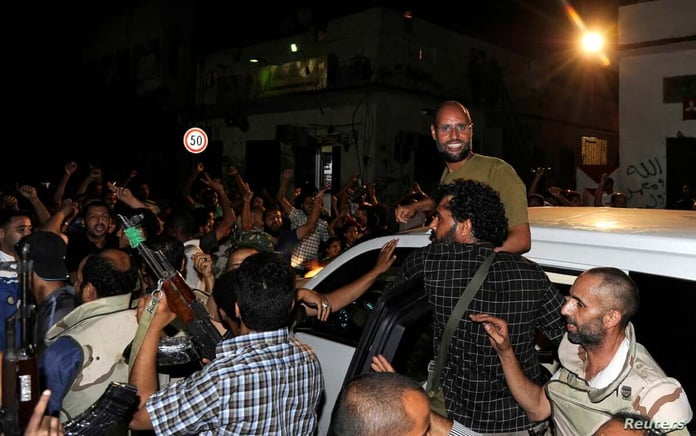
A decade after the overthrow of the late Libyan leader, Muammar Gaddafi, Russia is defying the United States and Europe, as well as Turkey, in an attempt to put Gaddafi’s son, Saif al-Islam, as ruler of the country, according to Bloomberg, quoting informed sources in Moscow.
Russian President Vladimir Putin abstained from voting at the United Nations to overthrow Gaddafi, 42 years after he took power.
‘A very personal matter’
A source close to the Kremlin confirmed that Putin sees Libya as a “very personal matter” and even feels responsible for Saif al-Islam.
According to the agency’s sources, Russia is pressuring General Khalifa Haftar to support Saif al-Islam, which will constitute an “unbeatable electoral mix”, but Haftar may not accept this, as he has been seeking to rule the country for years.
Supporting, opposing, and ‘tacitly approving’ states
Bloomberg also reported that Russia is confident of Egypt’s support for its plan, as well as Italy, for which Moscow obtained its tacit approval.
The sources reported that France and the UAE opposed the plan, while Turkey ruled out that the matter would take place.
The agency quoted an expert on Middle East affairs at the Institute of World Economy and International Relations of Moscow, Irina Zviagliskaya, calling for other powers to work with Moscow, because “Russia is interested in the stability of Libya.”
She added that “Gaddafi succeeded in keeping the country together and avoiding chaos and civil war, like Saddam Hussein in Iraq.”
‘Putin’s boldest move’
According to the agency, the Kremlin’s ploy, if successful, will enhance Russia’s influence in the Middle East, especially after Putin’s successful intervention to support the Assad regime in Syria, as he did with authoritarian leaders in Venezuela and Belarus.
“Restoring Gaddafi’s rule will be the boldest step yet for Putin,” the agency said.
According to the British Broadcasting Corporation BBC , it has long been suspected that Saif al- Islam has ties with Russia, and mercenaries “Wagner”, also believes that Moscow’s the preferred candidate for the leadership of Libya.
sudden return
Saif al-Islam Gaddafi suddenly appeared in public at the end of July for the first time since his disappearance several years ago, in a move that would affect the country’s political scene and possibly “complicate it further”, according to observers.
The fate of Saif al-Islam remained a mystery for four years, as he disappeared after the group holding him announced his release in June 2017.
An armed group in the city of Zintan (southwest of Tripoli) had arrested Gaddafi, in November 2011, and he was sentenced to death in a summary trial.
But the armed group refused to hand him over to the Tripoli authorities or the International Criminal Court, which accuses him of committing crimes against humanity, during the revolution that toppled his father’s regime in February 2011.
Gaddafi, the son, said in a rare interview with the New York Times that he wanted to “revive the lost unity” in Libya after a decade of chaos, and hinted at the possibility of running for the presidency.
The rare interview came no less than 5 months before the presidential elections scheduled for December 24, which reinforces the hypotheses about his intention to enter the political fray.
According to Reuters, Saif al-Islam was viewed by some as a potential reformist successor to his father in the years before the uprising and he remains an important figure for Gaddafi supporters.
A Tripoli court sentenced Saif al-Islam to death in absentia in 2015 on charges of war crimes, including the killing of protesters during the uprising. The International Criminal Court said at the time that the trial did not meet international standards.
The Hague-based International Criminal Court is also requesting his arrest on charges of “crimes against humanity”.
Libya descended into chaos after Gaddafi’s overthrow, as two competing governments and armed alliances wrangled for power. A UN-backed government in Tripoli is finding it difficult to extend its authority in light of its rejection by factions in the east, most notably the faction that follows Haftar.
After a decade of power struggle over foreign interference, an interim government took over Libya in March tasked with unifying institutions by organizing dual legislative and presidential elections in December.











